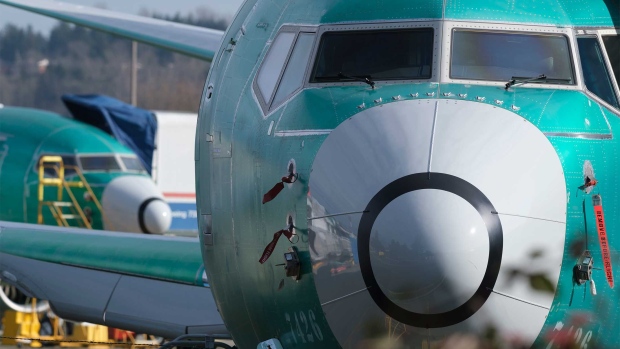Oct 18, 2019
Boeing Pilot Assured FAA 737 Was Safe After Scary Simulator Trip
, Bloomberg News

(Bloomberg) -- A Boeing Co. pilot who found the 737 Max feature implicated in two fatal crashes “egregious” in a simulator ride in 2016 reassured U.S. regulators two months later that it was benign.
Mark Forkner, the chief technical pilot for the 737 Max as it was in development, emailed an official at the Federal Aviation Administration in January 2017 to remind the agency that the safety feature wasn’t going to be included in flight manuals.
Pilots didn’t need to know about the Maneuvering Characteristics Augmentation System, which later would be linked to two fatal crashes, “since it’s way outside the normal operating envelope,” Forkner said in the email to the unidentified official.
The email was contained in a packet of additional documents reviewed by Bloomberg News Friday following the release earlier in the day of instant messages Forkner sent to a fellow Boeing pilot the previous November in which he expressed concern about MCAS.
In his November 2016 messages, Forkner said MCAS was “running rampant in the sim on me,” referring to a session in Boeing’s 737 Max simulator. “Granted, I suck at flying, but even this was egregious.”
The activation of MCAS due to malfunctions on a plane off the coast of Indonesia in October 2018 and another taking off in Ethiopia last March led pilots to lose control. The crashes killed a total of 346 people and led to the worldwide grounding of the Max, Boeing’s best-selling plane. Boeing is redesigning the system and FAA must approve it before it can fly again.
The flurry of leaks Friday, coming less than two weeks before Boeing’s embattled Chief Executive Officer Dennis Muilenburg is to testify before lawmakers, raised tensions between the planemaker and its regulator.
Muilenburg spoke to FAA Administrator Steve Dickson on Friday after Dickson demanded an explanation for why the company had the messages in their possession for months but didn’t inform the agency.
‘Concerning’ Communications
When asked about the phone call, FAA spokesman Lynn Lunsford referred to a statement issued earlier in the day by the agency saying it finds the communications “concerning.”
Muilenburg assured Dickson that it is “taking every step possible” to ensure the 737 Max’s safety and to return it to service, Boeing said in a statement.
Boeing produced the Forkner messages to “the appropriate investigating authority” and has been voluntarily cooperating with the House Transportation and Infrastructure Committee’s investigation, the statement said.
In a Jan. 17, 2017 email, Forkner reminded an FAA official to delete information about MCAS from materials written for pilots transitioning to the 737 Max from an older model of the jet. In the email, Forkner said “recall we decided we weren’t going to cover” MCAS in the 737 Max’s flight crew manuals because the system only operated “way outside the normal operating envelope.”
Flight Manual
That reminder came after Forkner, in March 2016, had asked two FAA officials if they would allow Boeing to remove all references to MCAS from flight crew manuals and training materials for the 737 Max, saying the system was “completely transparent to the flight crew and only operates WAY outside of the normal operating envelope,” an aviation term meaning typical flight conditions.
In a November 2016 instant message he told a colleague that he had concerns about MCAS after testing it in a simulator.
MCAS was “running rampant in the sim on me,” he said, referring to simulator tests of the aircraft. He said the plane was “trimming itself like crazy,” referring to a wing on the tail that pitches the plane’s nose up or down, according to the instant messages between Forkner and another Boeing technical pilot that were reviewed by Bloomberg News.
“So I basically lied to the regulators (unknowingly),” wrote Forkner, who now works for Southwest Airlines Co.
David Gerger, a lawyer for Forkner said in an email, “If you read the whole chat, it is obvious that there was no ‘lie.’”
“The simulator was not reading right and had to be fixed to fly like the real plane,” Gerger said. “Mark’s career -- at Air Force, at FAA, and at Boeing -- was about safety. And based on everything he knew, he absolutely thought this plane was safe.”
Some of Forkner’s other emails could be read as being tongue-in-cheek, such as a heavily redacted message to an FAA official in October 2015 that began with Forkner writing he was “just getting ready to hit breakfast then try and jedi mind trick these people into buying some airplanes!”
Representative Peter DeFazio, chairman of the House Transportation and Infrastructure Committee, said the panel’s probe into the 737 Max’s certification has found indications beyond Forkner’s emails that the jet’s approval was rushed under pressure from Boeing executives to maintain production schedules and achieve key goals for the jet, such as avoiding additional simulator training for pilots.
“You can’t just make him the scapegoat, this is not just him,” DeFazio, an Oregon Democrat said in an interview. “This was was cultural, it was massive pressure from what we’re seeing and hearing from other employees.”
In a letter to Transportation Secretary Elaine Chao late Friday, DeFazio said he was deeply troubled by Forkner’s emails, calling out one as outrageous and another as “indicating improper coziness between the regulator and the regulated -- coziness which I prohibited in legislation in 1996.”
DeFazio also sharply criticized the FAA’s responsiveness to the panel’s investigation, saying the agency has “slow walked” requests to interview FAA employees, among other issues.
A Transportation Department spokesman said on Friday night that it would respond directly to DeFazio.
To contact the reporters on this story: Alan Levin in Washington at alevin24@bloomberg.net;Ryan Beene in Washington at rbeene@bloomberg.net
To contact the editors responsible for this story: Jon Morgan at jmorgan97@bloomberg.net, John Harney
©2019 Bloomberg L.P.